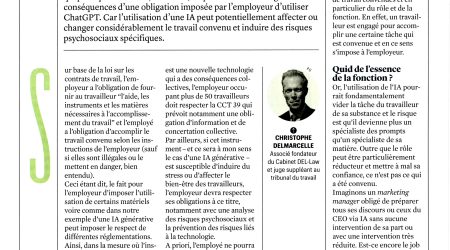A one-sided modification of the employment contract is not allowed
Posted the 12 September 2013My employer unilaterally changed my position. Faced with my refusal, he has threatened to fire me for urgent reasons. Is this possible?
The regulation regarding unilateral changes to employment conditions is very complicated in Belgian labor law. In short, even if the employment contract contains a change clause, your employer cannot unilaterally alter the employment conditions that are contractually defined and considered essential, such as the job position or the place of employment. A significant change can even be considered a termination of the employment contract after a formal notice. This is called 'constructive dismissal.' However, this only applies if the change in position has actually been implemented, as the employer's intent alone is not sufficient.
When an employer is confronted with an employee who refuses the job change, they may sometimes threaten to dismiss the employee for urgent reasons due to refusal to work. Generally, labor courts will not agree with this, because the employer did not have the right to unilaterally impose the change on the employee. Therefore, there is no refusal to work. In two cases, however, the court may still recognize the urgent reason. The first is when the change is minor and temporary, although there can be considerable debate about this. The second is when the employee does not first accept the change and then refuse it. The employee may even implicitly accept it by, for example, working for months under the modified conditions before objecting.
If you disagree with your employer's proposal, you should respond in writing — via email or letter — as soon as possible, indicating which change is involved and that it concerns a unilateral change to an essential employment condition. You express your refusal to accept the change and give the employer formal notice to restore you to your previous position. Otherwise, you reserve the right to take other measures, such as judicial termination or constructive dismissal, but this option can be risky.
Related articles

Is an employer allowed to mandate the use of artificial intelligence tools by employees ? (Trends, 17-07-2025)

Caution if a former colleague opposed to your employer asks you to testify in their favor
